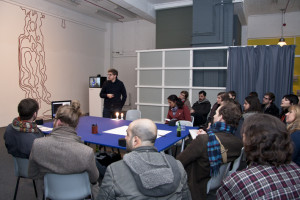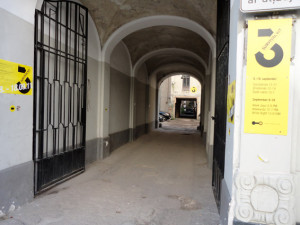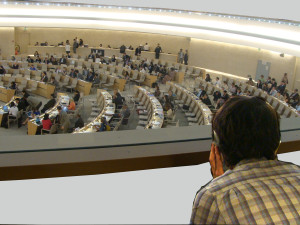
Short Course led by Lawrence Abu Hamdan
–
13 June – 18 July 2012
Course fees are £80/£65 concessions
A course designed by artist Lawrence Abu Hamdan, to critically engage with audio and the politics of listening. The course will look at works by artists, theoretical texts, audio technology, music, sound archives, as well as fragments of cinema, policy and legislation. The course aims to amplify and forensically deconstruct the relationship of listening and audio technology to politics, borders, human rights, testimony and international law. Participants will engage with a wide array of material drawn both from Lawrence Abu Hamdan’s Aural Contract Audio Archive and other material relating to the polemics at the heart of the Aural Contract project; a series of events, publications, performances, exhibitions, interviews, compositions and workshops that examines the politics of listening through a focus on the role of the voice in law.
This is an event to accompany the exhibition Lawrence Abu Hamdan: Aural Contract.
Course Programme:
Week 1
13 June, 6.30-8pm: The Voice in Law
This session will look at the sonic quality of speech acts and “legalese” focusing on texts by Mladen Dolar, Judith Butler and John Mowitt, Audio from the UK Parliament, Smadar Dreyfus’s installation about the Shouting Valley in Israel/Syria and films such as Emile di Antonio’s Point of Order.
Week 2
20 June, 6.30-8pm: Audio Infrastructures
This session will look at the audio systems that process, manipulate, distribute and record voices in the juridical and political forums. Looking at texts by Cornelia Vismann and Jonathan Sterne, audio from the trial of Saddam Hussein and the Tokyo Trial, films such as Costa Gavras’ The Confession, Stanley Kramer’s Inherit the wind and Eyal Sivan’s The Specialist as well as Sound art from Christina Kubisch.
Week 3
27 June, 6.30-8pm: Forensic Listening I
This session will look at the growing practice of forensic audiology, where in which through speaker profiling, voiceprints, the examination of sound propagation at crime scenes and the authentication of recorded media we hear the story of sound as evidence. Listening to the trial of Judas Priest, interviews with practitioners and Colin Powell’s 2003 UN speech with accompanying texts from Michel De Certeau and Theodor Adorno as well as scenes from Francis Ford Coppola’s The Conversation.
Week 4
4 July, 6.30-8pm: Forensic Listening II: The Political Topology of Accents
This session will listen more closely to the forensic practice of voice analysis and will expand specifically upon a text by Daniel Heller Roezen and Abu Hamdan’s own audio documentary The Freedom of Speech Itself which looks at the UK’s controversial use of voice analysis to determine the origins and authenticity of asylum seekers’ accents.
Week 5
11 July, 6.30-8pm: The Right To Silence
This session will focus on resistance, silence and legally inaudible uses of voice. Listening to police interview tapes, famous vocal impostor’s and examples of voice analysis as a method of lie detection with accompanied texts by Avital Ronell and Patrick Hanafin and scenes from Costa Gavras’ The Confession.
Week 6
18 July, 6.30-8pm: The Audio Documentary
This session will look at the aesthetic form of the audio documentary and audio essay and seeks to examine what the sonic medium contributes to the documentary form, how it negotiates the invisible and how it can be used to fine-tune the ear to a specific political argument. Listening to examples from the BBC, Radiolab, This American Life, Gregory Whitehead and Glenn Gould.

